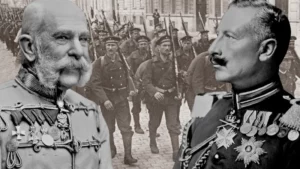By Patrick West

✅ AI Essay Writer ✅ AI Detector ✅ Plagchecker ✅ Paraphraser
✅ Summarizer ✅ Citation Generator
It takes a brave soul to write a revisionist history of the Second World War, one that goes against the orthodoxy that it was a noble fight against Nazism and evil. Revisionism in this field is unfortunately associated with Holocaust-denial, and even if most of today’s conservatives deem the Soviet Union a dishonourable—if vital—ally in the conflict, there remains an assumption that the Allies were generally the good guys who saved Europe from genocidal fascists.
I have lost count of the number of times I have read, or watched, British veterans of the war explain their chief motive for fighting: ‘It was either us or them’. To most of the protagonists, the conflict was not one against fascism, and certainly not to save the Jews. Testimony suggests that it was one of self-preservation. This was war against the Germans, not the Nazis.
‘Stopping the persecution of the Jews never was an Allied war aim—at least not until after the war’, James Heartfield writes in his new book, Unpatriotic History of the Second World War. Indeed, at the outset of the conflict, mention of atrocities against the Jews was specifically excluded from British propaganda, with a Ministry of Information White Paper declaring: ‘A certain amount of horror is needed but it must be dealt always with treatment of indisputable innocent people. Not with Jews’. Winston Churchill had talked about the Soviet Union as a ‘world wide communistic state under Jewish domination’, fearing ‘these Semitic conspirators’. This was before circumstances dictated the Soviet Union became a Good Guy.
Far from being a battle between good and evil, the Second World War, presented here, was a cynical undertaking. Heartfield disputes the popular notion that it was ‘a people’s war’. Rather, it was to protect imperial states and capitalism—the chief beneficiary on both counts being the United States. ‘The struggle over Empire was the cause of the Second World War. Those countries that tried to enlarge their empires clashed with those who were trying to defend their own’. It was a conflict fought on racial and class lines. ‘Stay On The Job Until Every Murdering Jap is Wiped Out!’ ran one US Army Poster, while the old adage ‘A bayonet is a weapon with a worker at either end’ was re-worked by the American financier Jay Gould: ‘I can hire one half of the working class to kill the other half’.
This is strong stuff, and in sharp contrast with today’s best-selling histories, which in Britain and the US largely concern themselves with noble battles and patriotic fortitude, in Normandy and in the Blitz. Many of these do address Allied barbarity, but events such as the bombing of Dresden or Hiroshima are framed as aberrations—exceptions to an otherwise onerous if righteous task. In Heartfield’s estimation, however, from the outset, the Allies ‘objected to German domination because it threatened their own global standing’.
As Hitler said in 1940: ‘Germany is not striving to smash Britain because the beneficiary will not be us, but Japan in the east, Russia in India, Italy in the Mediterranean and America in World Trade. That is why peace is perfectly possible with Britain—but not so long as Churchill is Prime Minister.’ The United States would indeed be a beneficiary, as it had planned to. It refused to offer Germany a conditional surrender, thereby a tangible opt-out from the fighting, and Heartfield says it delayed the ‘Second Front’ in Europe until June 1944 to be ‘sure that the peoples of Germany, Russia and lands between them would be locked into a war of total destruction, leaving America to dictate the terms afterwards’. (This is plausible, but perhaps cynical. D-Day did require a great deal of planning, and the British and Canadians were especially cautious about repeating the catastrophic Dieppe raid of 1942.)
The United States claimed to be fighting for democracy, but not all were convinced. A pamphlet by CLR James that circulated in Harlem scoffed at the idea: ‘I have no democracy and the democracy I haven’t got, Hitler didn’t take from me.’ Some black Americans who were roused by anti-fascist rhetoric started their own ‘Double V’ campaign: for victory over fascism abroad and racism at home. Meanwhile abroad, a battle-cry of the US Marines in the Pacific was ‘Kill the Jap bastards. Take no prisoners’.
Most people today understand that the fanatical Bushido code forbade the Japanese from surrendering, ‘but the reason so few Japanese prisoners were taken was that the Allies… took no prisoners’. The spectre of the fanatical Jap was a self-fulfilling prophesy. As one Australian remarked: ‘We knew their bushido banzai code was to take no prisoners in battle and never surrender. So we killed them’. The war correspondent of the Atlantic Monthly recalled: ‘We shot prisoners in cold blood, wiped out hospitals, strafed lifeboats, killed or mistreated enemy civilians, finished off the enemy wounded, tossed the dying into a hole with the dead, and in the Pacific, boiled the flesh off enemy skulls to make table ornaments for sweethearts’. Racism was not manifest only among American ranks. In Abyssinia, Italian settlers appealed to British soldiers to save them from Ethiopians fighting for the Allies, and they often acquiesced to their appeals. According to the war correspondent Alan Moorehead, in many places ‘Empire troops and Italians were fighting side by side against the angry natives’. This prompted his driver to inquire who ‘the hell are we fighting anyway—the Wops or them niggers?’
The conflict was further complicated by issues of class, which may partly explain why France capitulated so easily. Heartfield writes of the resentment among much of the propertied classes directed towards the Jewish Prime Minister, Leon Blum, and how he had allowed the working classes to go on strike. According to Arthur Koestler, reactionary figures in France were ‘scared by the bogy of social revolution, they regarded Hitler as their saviour.’ Working class consciousness was not extinguished by the conflict, with strikes in France, America, and in Mussolini’s Italy. Resistance to Hitler in Germany came not just from conservatives such as Claus von Stauffenberg, but from Leftist agitators such as the Edelweiss Pirates, who infiltrated government and military officers—and paid with their lives for doing so. Class etiquette was often maintained between warring nations. When in 1942, a British ship carrying British troops and German prisoners arrived in Halifax, Canada, the German officers complained that they could not be expected to carry their own bags ashore. Their captors agreed, wrote Moorehead, ‘so the British Tommies were ordered to take the German luggage ashore… angry to the point of mutiny with their own officers.’
This episode strikes us as curious, because it was an aberration. Nationalism, however deceptive, is powerful. ‘The claims of the working classes to a greater share of the national wealth, and a greater say in the governing of the land were subdued in the name of a supposedly greater glory, the nation’. In times of war, class solidarity will whither in the face of nationalism, an ideology which gives the powerful illusion that fellow countrymen share the same blood. Anything that gives one the (false) idea that one is fighting for an extended family will trump class solidarity. The ‘us or them’ mentality could be adjudged a case of ‘false consciousness’, but it was sincerely held nevertheless.
Unpatriotic History of The Second World War is a much-need addition to its canon, an impassioned corrective to a Tolkienesque view of the conflict—although it will arouse accusations of ‘moral equivalence’. Yet, we are prone to view this conflict in Manichaean terms, because it serves society’s needs today. As Heartfield points out: ‘The Holocaust has become a defining issue in contemporary morality, the one incontestable wickedness in an age that struggles to define the boundaries of right and wrong’. Instead of adhering to the myth that the Second World War was a fight against fascism, the Left and the Right in Britain could agree it was a war of self-interest. Whether you think it was waged on behalf capitalist-imperialism, or to ‘defend our island, whatever the cost may be’, is up to you.
—————-
Written under a Creative Commons License, with edits: https://creativecommons.org/licenses/by/1.0/
Follow us on Reddit for more insights and updates.





Comments (0)
Welcome to A*Help comments!
We’re all about debate and discussion at A*Help.
We value the diverse opinions of users, so you may find points of view that you don’t agree with. And that’s cool. However, there are certain things we’re not OK with: attempts to manipulate our data in any way, for example, or the posting of discriminative, offensive, hateful, or disparaging material.